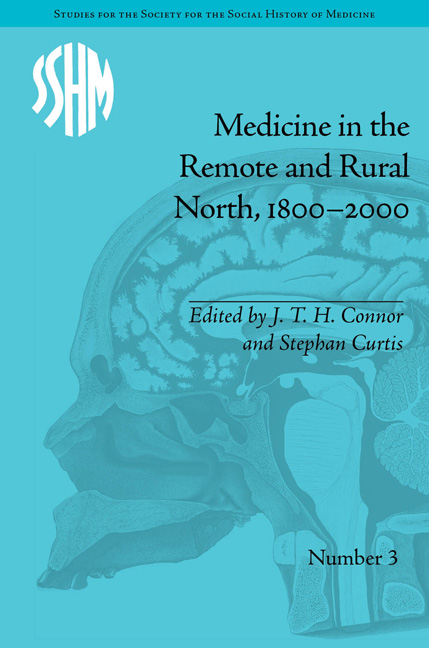Book contents
- Frontmatter
- CONTENTS
- Acknowledgements
- List of Contributors
- List of Figures and Tables
- Introduction: Cores/Peripheries – Rural/Remote: Medicine, Health-Care Delivery and the North
- Part I Remote Medicine and the State
- Part II Doctors and Doctoring in Remote Areas
- Part III Women, Health Care and the Practice of Medicine
- Notes
- Index
Part II - Doctors and Doctoring in Remote Areas
- Frontmatter
- CONTENTS
- Acknowledgements
- List of Contributors
- List of Figures and Tables
- Introduction: Cores/Peripheries – Rural/Remote: Medicine, Health-Care Delivery and the North
- Part I Remote Medicine and the State
- Part II Doctors and Doctoring in Remote Areas
- Part III Women, Health Care and the Practice of Medicine
- Notes
- Index
Summary
Introduction
This section examines physicians’ efforts to practise medicine in widely diverse societies and the duties they envisioned for themselves. In the first case, Sören Edvinsson clearly shows that Dr Ellmin did not see himself as solely a purveyor of modern medicine to a remote area of nineteenth-century Sweden. There is no doubt that Ellmin also believed he was engaged in an adventure that he felt compelled to document. His mission was not only a ‘civilizing’ one; he also wanted his superiors in Stockholm and the Swedish public to learn about the hardships these residents of the north endured. Ellmin was a doctor, an adventurer and, to some degree, an advocate for the Sami people. As such he found himself in the liminal position between state employee with an obligation to introduce academic medicine as defined by his superiors in Stockholm, and social critic who believed that the government had an obligation to improve the physical and economic conditions in which the people lived. Øivind Larsen's contribution focuses more attention on the degree to which doctors were able to direct medical legislation particularly during periods of abnormal morbidity or mortality. He concludes that such legislation was often based upon perceptions held by distant physicians rather than cold scientific or statistical data. We find doctors asking whether certain patterns were unusual and, if so, were they markedly different than what had come before? Were the people themselves responsible for their ill-health or was their condition evidence of government neglect?
- Type
- Chapter
- Information
- Medicine in the Remote and Rural North, 1800–2000 , pp. 91 - 92Publisher: Pickering & ChattoFirst published in: 2014



